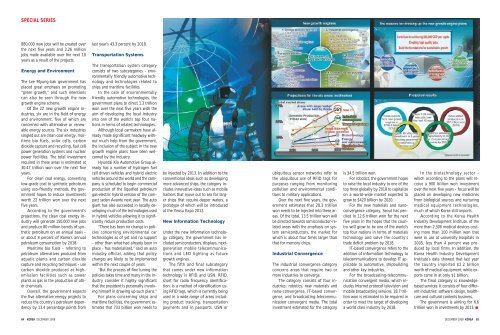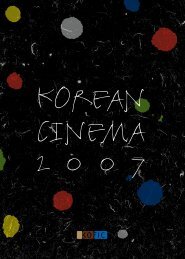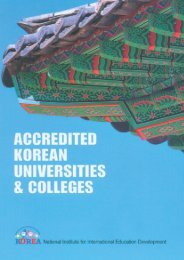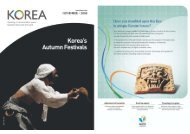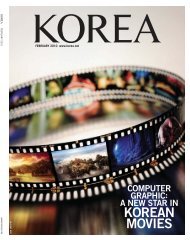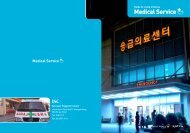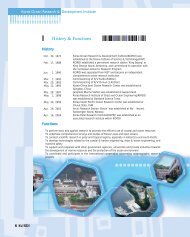Seoul Lights Up for the Holiday Season - Korea.net
Seoul Lights Up for the Holiday Season - Korea.net
Seoul Lights Up for the Holiday Season - Korea.net
You also want an ePaper? Increase the reach of your titles
YUMPU automatically turns print PDFs into web optimized ePapers that Google loves.
SPECIAL SERIES<br />
880,000 new jobs will be created over<br />
<strong>the</strong> next five years and 2.26 million<br />
jobs made available over <strong>the</strong> next 10<br />
years as a result of <strong>the</strong> projects.<br />
Energy and Environment<br />
The Lee Myung-bak government has<br />
placed great emphasis on promoting<br />
“green growth,” and such intentions<br />
can also be seen through <strong>the</strong> new<br />
growth engine scheme.<br />
Of <strong>the</strong> 22 new growth engine industries,<br />
six are in <strong>the</strong> field of energy<br />
and environment, five of which are<br />
concerned with alternative or renewable<br />
energy sources. The six industries<br />
singled out are clean coal energy, maritime<br />
bio fuels, solar cells, carbon<br />
dioxide capture and recycling, fuel cell<br />
power generation systems and nuclear<br />
power facilities. The total investment<br />
required in <strong>the</strong>se areas is estimated at<br />
30.47 trillion won over <strong>the</strong> next five<br />
years.<br />
For clean coal energy, converting<br />
low-grade coal to syn<strong>the</strong>tic petroleum<br />
using eco-friendly methods, <strong>the</strong> government<br />
hopes to induce investments<br />
worth 22 trillion won over <strong>the</strong> next<br />
five years.<br />
According to <strong>the</strong> government’s<br />
projections, <strong>the</strong> clean coal energy industry<br />
will generate 150,000 new jobs<br />
and produce 80 million barrels of syn<strong>the</strong>tic<br />
petroleum on an annual basis -<br />
or about 8 percent of <strong>Korea</strong>’s annual<br />
petroleum consumption by 2018.<br />
Maritime bio fuels - referring to<br />
petroleum alternatives produced from<br />
aquatic plants and carbon dioxide<br />
capture and recycling techniques - use<br />
carbon dioxide produced at highemission<br />
facilities such as power<br />
plants as gas in <strong>the</strong> production of o<strong>the</strong>r<br />
chemicals.<br />
Overall, <strong>the</strong> government expects<br />
<strong>the</strong> five alternative energy projects to<br />
reduce <strong>the</strong> country’s petroleum dependency<br />
by 13.4 percentage points from<br />
last year’s 43.3 percent by 2018.<br />
Transportation Systems<br />
The transportation system category<br />
consists of two subcategories - environmentally<br />
friendly automotive technology<br />
and technologies related to<br />
ships and maritime facilities.<br />
In <strong>the</strong> case of environmentally<br />
friendly automotive technologies, <strong>the</strong><br />
government plans to direct 1.3 trillion<br />
won over <strong>the</strong> next five years with <strong>the</strong><br />
aim of developing <strong>the</strong> local industry<br />
into one of <strong>the</strong> world’s top four nations<br />
in terms of related technologies.<br />
Although local carmakers have already<br />
made significant headway without<br />
much help from <strong>the</strong> government,<br />
<strong>the</strong> inclusion of <strong>the</strong> subject in <strong>the</strong> new<br />
growth engine plans have been welcomed<br />
by <strong>the</strong> industry.<br />
Hyundai Kia Automotive Group already<br />
has a number of hydrogen fuel<br />
cell driven vehicles and hybrid electric<br />
vehicles around <strong>the</strong> world and <strong>the</strong> company<br />
is scheduled to begin commercial<br />
production of <strong>the</strong> liquefied petroleum<br />
gas-electric hybrid version of <strong>the</strong> compact<br />
sedan Avante next year. The auto<br />
giant has also succeeded in locally developing<br />
much of <strong>the</strong> technologies used<br />
in hybrid vehicles allowing it to significantly<br />
reduce production costs.<br />
“There has been no change in policies<br />
concerning environmental car<br />
technologies as of yet and no support<br />
- o<strong>the</strong>r than what had already been in<br />
place - has materialized,” said an auto<br />
industry official, adding that policy<br />
changes are likely to be implemented<br />
within <strong>the</strong> next couple of years.<br />
“But <strong>the</strong> process of fine tuning <strong>the</strong><br />
policies takes time and many in <strong>the</strong> industry<br />
consider it highly significant<br />
that <strong>the</strong> president is personally involving<br />
himself in drawing up such plans.”<br />
For plans concerning ships and<br />
maritime facilities, <strong>the</strong> government estimates<br />
that 733 billion won needs to<br />
be injected by 2013. In addition to <strong>the</strong><br />
conventional ideas such as developing<br />
more advanced ships, <strong>the</strong> category includes<br />
innovative ideas such as mobile<br />
harbors that move out to sea <strong>for</strong> larger<br />
ships that require deeper waters, a<br />
prototype of which will be introduced<br />
at <strong>the</strong> Yeosu Expo 2012.<br />
New In<strong>for</strong>mation Technology<br />
Under <strong>the</strong> new in<strong>for</strong>mation technology<br />
category, <strong>the</strong> government has included<br />
semiconductors, displays, nextgeneration<br />
mobile telecommunications<br />
and LED lighting as future<br />
growth engines.<br />
The fifth and final subcategory<br />
that comes under new in<strong>for</strong>mation<br />
technology is RFID and USN. RFID,<br />
short <strong>for</strong> radio frequency identification,<br />
is a method of identification using<br />
RFID tags, which is currently being<br />
used in a wide range of areas including<br />
product tracking, transportation<br />
payments and in passports. USN or<br />
ubiquitous sensor <strong>net</strong>works refer to<br />
<strong>the</strong> ubiquitous use of RFID tags <strong>for</strong><br />
purposes ranging from monitoring<br />
pollution and environmental conditions<br />
to military applications.<br />
Over <strong>the</strong> next five years, <strong>the</strong> government<br />
estimates that 28.3 trillion<br />
won needs to be injected into <strong>the</strong>se areas.<br />
Of <strong>the</strong> total, 13.5 trillion won will<br />
be directed towards semiconductor-related<br />
areas with <strong>the</strong> emphasis on system<br />
semiconductors, <strong>the</strong> market <strong>for</strong><br />
which is about four times larger than<br />
that <strong>for</strong> memory chips.<br />
Industrial Convergence<br />
The industrial convergence category<br />
concerns areas that require two or<br />
more industries to converge.<br />
The category consists of four industries:<br />
robotics, new materials and<br />
nano-convergence, IT-based convergence,<br />
and broadcasting-telecommunication<br />
convergent media. The total<br />
investment estimated <strong>for</strong> <strong>the</strong> category<br />
is 34.5 trillion won.<br />
For robotics, <strong>the</strong> government hopes<br />
to raise <strong>the</strong> local industry to one of <strong>the</strong><br />
top three globally by 2018 to capitalize<br />
on a world-wide market expected to<br />
grow to $420 billion by 2020.<br />
For <strong>the</strong> new materials and nanoconvergence<br />
category, <strong>Seoul</strong> has penciled<br />
in 12.6 trillion won <strong>for</strong> <strong>the</strong> next<br />
five years in <strong>the</strong> hopes that <strong>the</strong> country<br />
will grow to be one of <strong>the</strong> world’s<br />
top four nations in terms of materials<br />
technology and solve <strong>the</strong> country’s<br />
trade deficit problem by 2018.<br />
IT-based convergence refers to <strong>the</strong><br />
addition of in<strong>for</strong>mation technology to<br />
telecommunications to develop IT applicable<br />
to automotive, shipbuilding<br />
and o<strong>the</strong>r key industries.<br />
For <strong>the</strong> broadcasting-telecommunication<br />
convergent media, which includes<br />
inter<strong>net</strong> protocol television and<br />
mobile broadcasting services, 18.7 trillion<br />
won is estimated to be required in<br />
order to meet <strong>the</strong> target of developing<br />
a world class industry by 2018.<br />
In <strong>the</strong> biotechnology sector -<br />
which according to <strong>the</strong> plans will receive<br />
a 900 billion won investment<br />
over <strong>the</strong> next five years - focus will be<br />
placed on developing new medicines<br />
from biological sources and nurturing<br />
medical equipment technologies,<br />
much of which <strong>Korea</strong> still imports.<br />
According to <strong>the</strong> <strong>Korea</strong> Health<br />
Industry Development Institute, of <strong>the</strong><br />
more than 2,300 medical devices costing<br />
more than 100 million won that<br />
were in use at university hospitals in<br />
2005, less than 4 percent was produced<br />
by local firms. In addition, <strong>the</strong><br />
<strong>Korea</strong> Health Industry Development<br />
Institute’s data showed that last year<br />
<strong>the</strong> country imported $2.2 billion<br />
worth of medical equipment, while exports<br />
came in at only $1 billion.<br />
The final category is knowledgebased<br />
services. It consists of four different<br />
industries: software, design, healthcare<br />
and cultural contents business.<br />
The government is aiming <strong>for</strong> 6.6<br />
trillion won in investments by 2013. ■<br />
64 KOREA DECEMBER 2008<br />
DECEMBER 2008 KOREA 65


